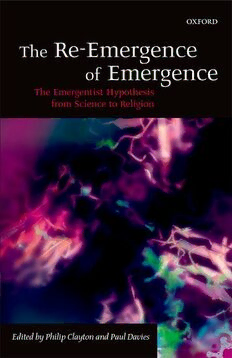Download The reemergence of emergence: the emergentist hypothesis from science to religion PDF Free - Full Version
Download The reemergence of emergence: the emergentist hypothesis from science to religion by Philip Clayton, Paul Davies (editors) in PDF format completely FREE. No registration required, no payment needed. Get instant access to this valuable resource on PDFdrive.to!
About The reemergence of emergence: the emergentist hypothesis from science to religion
• Offers an authoritative introduction to the entire field of emergence studies• Presents the most recent literature and conclusions, in a thoroughly readable style• Bridges the classical divide between the "two cultures" of the sciences and the humanities and engages the growing field of science and religionMuch of the modern period was dominated by a "reductionist" theory of science. On this view, to explain any event in the world is to reduce it down to fundamental particles, laws, and forces. In recent years reductionism has been dramatically challenged by a radically new paradigm called "emergence". According to this new theory, natural history reveals the continuous emergence of novel phenomena: new structures and new organisms with new causal powers. Consciousness is yet one more emergent level in the natural hierarchy. Many theologians and religious scholars believe that this new paradigm may offer new insights into the nature of God and God's relation to the world.This volume introduces readers to emergence theory, outlines the major arguments in its defence, and summarizes the most powerful objections against it. Written by experts but suitable as an introductory text, these essays provide the best available presentation of this exciting new field and its potentially momentous implications.
Detailed Information
| Author: | Philip Clayton, Paul Davies (editors) |
|---|---|
| Publication Year: | 2006 |
| ISBN: | 9780191516016 |
| Pages: | 345 |
| Language: | English |
| File Size: | 3.743 |
| Format: | |
| Price: | FREE |
Safe & Secure Download - No registration required
Why Choose PDFdrive for Your Free The reemergence of emergence: the emergentist hypothesis from science to religion Download?
- 100% Free: No hidden fees or subscriptions required for one book every day.
- No Registration: Immediate access is available without creating accounts for one book every day.
- Safe and Secure: Clean downloads without malware or viruses
- Multiple Formats: PDF, MOBI, Mpub,... optimized for all devices
- Educational Resource: Supporting knowledge sharing and learning
Frequently Asked Questions
Is it really free to download The reemergence of emergence: the emergentist hypothesis from science to religion PDF?
Yes, on https://PDFdrive.to you can download The reemergence of emergence: the emergentist hypothesis from science to religion by Philip Clayton, Paul Davies (editors) completely free. We don't require any payment, subscription, or registration to access this PDF file. For 3 books every day.
How can I read The reemergence of emergence: the emergentist hypothesis from science to religion on my mobile device?
After downloading The reemergence of emergence: the emergentist hypothesis from science to religion PDF, you can open it with any PDF reader app on your phone or tablet. We recommend using Adobe Acrobat Reader, Apple Books, or Google Play Books for the best reading experience.
Is this the full version of The reemergence of emergence: the emergentist hypothesis from science to religion?
Yes, this is the complete PDF version of The reemergence of emergence: the emergentist hypothesis from science to religion by Philip Clayton, Paul Davies (editors). You will be able to read the entire content as in the printed version without missing any pages.
Is it legal to download The reemergence of emergence: the emergentist hypothesis from science to religion PDF for free?
https://PDFdrive.to provides links to free educational resources available online. We do not store any files on our servers. Please be aware of copyright laws in your country before downloading.
The materials shared are intended for research, educational, and personal use in accordance with fair use principles.

